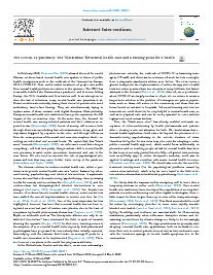The COVID-19 pandemic : The ‘black swan’ for mental health care and a turning point for e-health
In February 2020, Duan and Zhu (2020) stressed the need for a solid Chinese evidence-based mental health care system in times of public health emergencies such as the outbreak of the Coronavirus disease- 2019 (COVID-19). That would enable treatment of people who suffer from mental health problems in relation to the epidemic. The WHO has meanwhile labelled the Coronavirus a pandemic, and it is now hitting Europe, the USA, Australia and Asia hard as well. In an attempt to reduce the risk of infections, many mental health care providers in afflicted countries are currently closing their doors for patients who need ambulatory face-to-face therapy. They are simultaneously trying to replace some of these contacts with digital therapies. Most probably, European mental health care institutions have yet to experience the full impact of the coronavirus crisis. At the same time, the demand for mental health care among infected patients and their relatives is expected to rise (Blumenstyk, 2020). Levels of anxiety will increase, both through direct causes including fears of contamination, stress, grief, and depression triggered by exposure to the virus, and through influences from the consequences of the social and economic mayhem that is occurring on individual and societal levels. We expect that this “black swan” moment (Blumenstyk, 2020) - an unforeseen event that changes everything - will lead to a partly, though robust, shift in mental health care provision towards online prevention, treatment, and care in the near future. We also need to consider the role of psychological processes and fear that may cause further harm on top of the pandemic (Asmundson and Taylor, 2020).
In: Internet Interventions ; ISSN:2214-7829 | 20 | 100317 | april
https://doi.org/10.1016/j.invent.2020.100317


